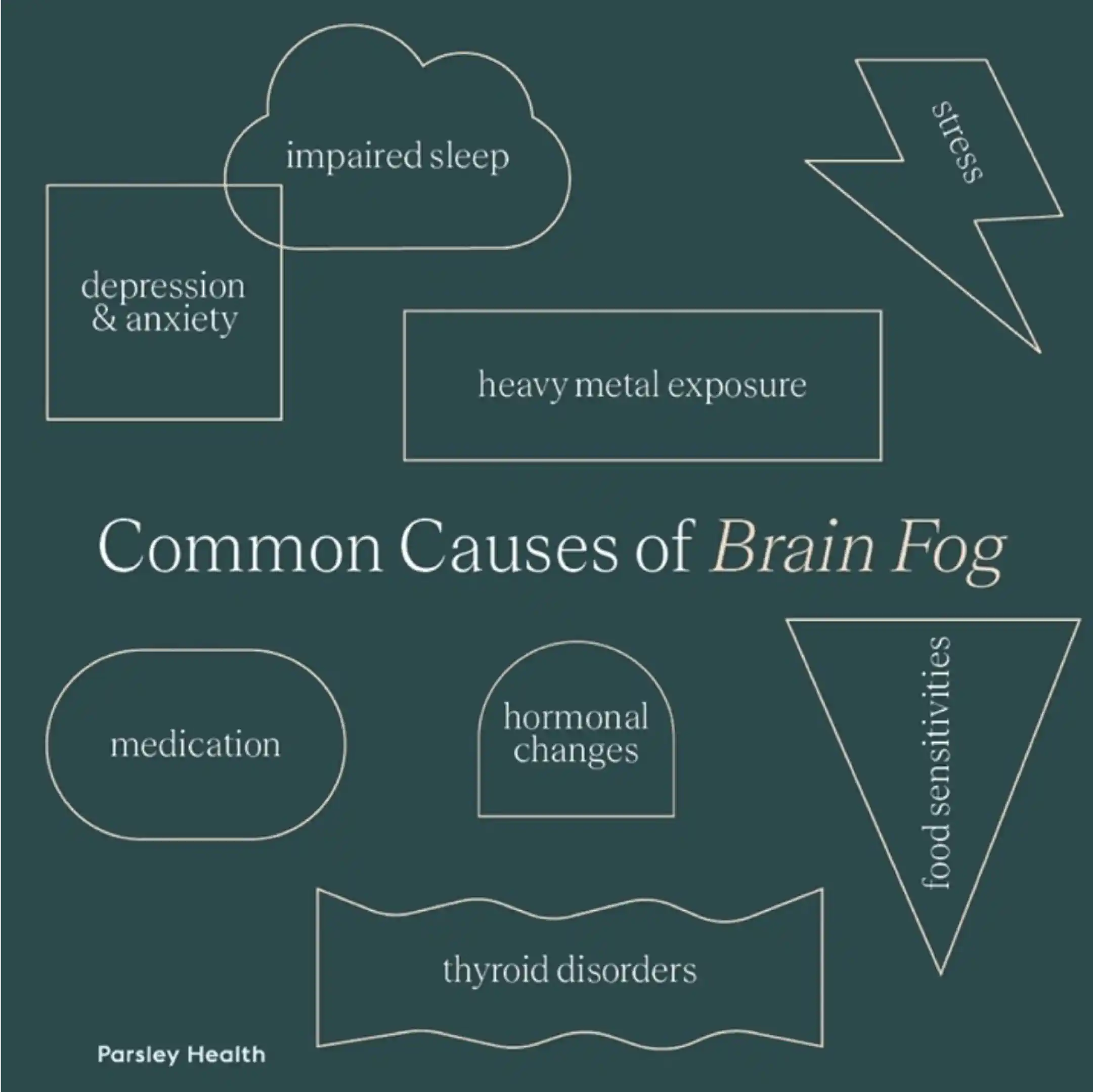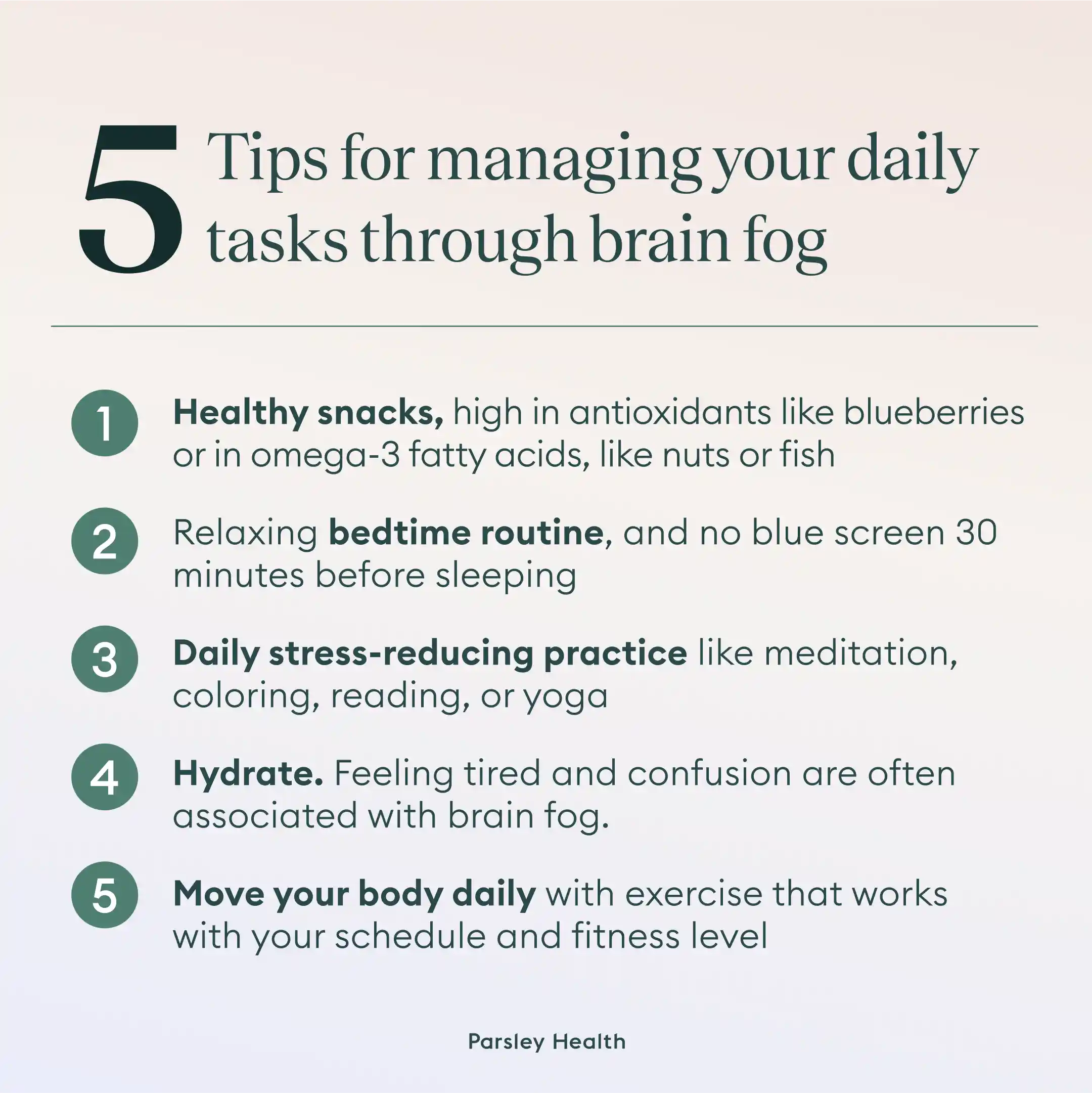This article has been medically reviewed by Nisha Chellam, MD, and Jaclyn Tolentino, D.O.
What is brain fog?
This umbrella term for thinking and cognitive difficulties can make you feel unlike yourself, affect your work and relationships, and leave you feeling destabilized. Read on to find out how to take control of brain fog and start feeling like yourself again.
Brain health is not only critical to mental capacity, but is paramount to emotional wellbeing. Your feelings and your thoughts are intimately connected—in order to feel good, you have to "think good." Many Parsley Health members come to us looking for better mental focus and to beat brain fog. Our providers often use targeted functional labs alongside in-depth clinical care to help women uncover the early, hidden factors behind fuzzy thinking. Sometimes it’s just not obvious what’s below the surface—and that’s where a clinical, root-cause lens can help.
What does brain fog feel like?
Have you ever thought, My brain is not working correctly? You could be suffering from brain fog. Often, it looks like an inability to concentrate like you used to on work tasks, conversations, or even on the words you’re reading right now. You may have difficulty making up your mind, which means small decisions become a big deal. You may need more coffee to focus, more snacks to stay awake, and a couple of glasses of wine to fall asleep at night. In more severe cases, you might have headaches, problems with your vision, or even nausea.
Feeling like your brain isn’t keeping up is so common—but that doesn’t mean it’s normal. In our functional medicine model, we combine one-on-one clinical exams with lab insights to help women dig into what might be disrupting focus—whether it’s inflammation, hormones, or subtle nutrient imbalances.
Brain fog causes: understanding how you're impacted
What causes brain fog? Brain fog can be a symptom of a nutrient deficiency, sleep disorder, bacterial overgrowth from overconsumption of sugar, depression, or even hormone dysfunction, such as a thyroid condition or perimenopause. Other common brain fog causes include eating too much and too often, inactivity, not getting enough sleep, chronic stress, and a poor diet.

Below are some of the most common causes of brain fog that we see at Parsley Health.
Sleep Apnea
The most common, and often underdiagnosed, cause of brain fog is sleep apnea, says Nisha Chellam, MD, a board-certified physician in internal medicine and holistic and integrative medicine at Parsley Health. Sleep apnea, a condition where the airways collapse completely or partially for short intervals while asleep, is associated with frequent arousals from sleep throughout the night.
Because it's difficult to stay asleep, sleep apnea often causes daytime sleepiness and brain fog.
Hormonal changes
Hormonal transitions happen throughout our lives: the onset of puberty, during and after pregnancy (sometimes this is called "mom brain"), menopause, or due to changes in our environment and lifestyle. Oftentimes these periods of change can leave your brain feeling fuzzy and confused—one study found that 60 percent of women have difficulty concentrating during menopause.
In some cases, changing mood or sleep habits could be contributing to your foggy feelings, but brain fog can also be caused by fluctuating hormone levels while your body tries to restore balance.
Bad sleep habits
Poor sleep hygiene—like an irregular sleep and wake time, getting less than seven to eight hours of sleep a night, or blue light exposure before bed—can disrupt your natural circadian rhythm (AKA your internal body clock) and impact brain function.
Having a wake time that doesn’t fall at the end of a sleep cycle can impair your cognitive function, causing you to be more tired and foggy during the day. Apps like Sleep Cycle use your movement throughout the night to track what stage of sleep you’re in and sets an alarm to go off at the end of your sleep cycle, ensuring you won’t be disrupted mid-deep sleep. (Note that hitting the snooze button once your alarm goes off won’t make you feel more rested, but instead increases the likelihood of you falling asleep, only to be disrupted again.)
In the case of blue light exposure, the blue wavelengths decrease production of the hormone, melatonin, which is essential for deep REM sleep. Both REM and non-REM sleep are required to consolidate and process memories from the day. During the hours of 10pm and 2am is when your body and brain detoxify the most, so remaining in an active state during this time disrupts the body’s natural detoxification process and can contribute to fogginess.
Long COVID
After the initial infection is gone, COVID can continue to disrupt daily life. When this happens, long COVID is often to blame. Dr. Chellam notes that cognitive impairment is one of the most common side effects of this condition. In one study, 24% of patients with long covid reported cognitive complications, including problems with memory and concentration.
Researchers are still investigating why this side effect occurs, though some suggest long COVID brain fog may be due to lower levels of serotonin, suggesting the virus can disrupt the body's hormone and chemical production.
Diet deficiencies and food sensitivities
Vitamin B12 contributes to the formation of red blood cells and the maintenance of your central nervous system. It’s why a deficiency in B12 is sure to impair your energy levels and elicit an overall feeling of fatigue. A vitamin D deficiency can also be behind brain fog as decreased vitamin D levels are associated with impaired cognitive function.
An unidentified food intolerance can also contribute to the foggy head feeling you’re experiencing. For example, gluten intolerance can lead to cognitive dysfunction via inflammatory pathways. Advanced blood work that looks at your nutrient levels as well as an elimination diet or food allergy or sensitivity testing can determine if any of these could be contributing to your brain fog.
Stress
It's true: chronic stress can wreak havoc on your health. When your body perceives a stressful situation, it activates the sympathetic nervous system (SNS), or the fight-or-flight response. This response triggers the release of epinephrine, also known as adrenaline, and norepinephrine, and ultimately diverts energy away from your body’s typical functions and towards the stressor. This can make it difficult to think clearly, harder to focus, and could exhaust your brain. Learning to reduce your stress over time through interventions like meditation, exercise, or dietary changes, may help when your brain feels foggy.
Medication
Certain medications—both prescription and over-the-counter—are known to cause brain fog as a side effect. Though your head feeling cloudy while taking medication may be made out to seem normal and expected, it’s not. At Parsley Health, we believe in lifestyle interventions that solve your underlying issues before turning to medication. But if medication is necessary, your doctor can help you determine if your medication is compromising your brain health and work with you to find the right remedy—whether that’s changing medications or lowering your dosage.
Depression and anxiety
Depression and anxiety have been shown to impair cognitive function , affecting executive function, attention, and memory. Research suggests that this could be linked to either the loss of energy and motivation associated with mental health conditions, or physiological effects on the brain that make it difficult to function properly. If you struggle with depression or anxiety, talk to your healthcare provider about treatment options.
Thyroid disorders
Whether you feel tired all the time, lack focus and mental clarity, or deal with mood changes, a thyroid disorder may be at the root of your symptoms. This butterfly-shaped gland at the front of your neck is responsible for producing and releasing hormones that control everything from metabolism and heart rate to breathing and menstrual cycles and are frequently linked to brain fog. This is especially true with Hashimoto’s thyroiditis, an autoimmune immune disease where your immune system attacks your thyroid, inhibiting it from producing enough thyroid hormones and creating an inflammatory state. But whether your thyroid gland is producing too much thyroid hormone (hyperthyroidism) or too little thyroid hormone (hypothyroidism), this could be causing your brain fog. Other symptoms of a thyroid disorder can include weight loss or gain, fatigue, muscle weakness and digestive issues.
If you think a thyroid issue may be at play, talk to your doctor about a thyroid test. Many doctors will look at your TSH levels, but in reality there are other thyroid markers that can give a better picture of what’s going on. At Parsley Health, doctors routinely check Free T4, Total T4, Free T3, Reverse T3, anti-TPO antibodies, and anti-thyroglobulin to assess your thyroid health.
Heavy metal exposure
Heavy metals are everywhere in our daily lives—our food, beauty products, and even teeth fillings. The most common sources of heavy metal exposure are arsenic, mercury, aluminum, lead, thallium, and cesium. And while limited amounts of these metals won’t necessarily cause toxicity, heavy metal accumulation resulting from chronic exposure overtime can cause immune dysfunction, hormone imbalance, fatigue, brain fog, and high blood pressure.
Testing levels of heavy metals in your blood is a good way to ensure your body is toxin-free, and regularly incorporating detox practices like heart-rate raising physical activity or weekly sauna sessions is a great start to keeping your levels under control and reducing any symptoms.
Brain fog treatment: how to get rid of brain fog
At Parsley Health, we work with our members to get to the root cause of their issues and resolve brain fog for good. As part of your brain fog treatment, your medical provider will work with you to understand your complete health history, symptoms, and then order the appropriate lab work to test things like your thyroid function and heavy metal levels.
With this information, your medical provider can craft a personalized health plan to address your brain fog and any other symptoms you may be experiencing. These are a few recommendations our medical providers and health coaches may have to help you get rid of brain fog.
1. Give your digestive system a rest.
Intermittent fasting is all the rage in the nutrition and weight loss world. But it’s not just beneficial for dropping pounds, calorie restriction and longer periods between meals can also promote neurological health and decrease neurodegenerative diseases.
To treat your brain fog and gain back some mental clarity, start with trying to extend the time between the last meal of the day and the first meal of the next day. Shoot for 12 hours. This promotes a process called ketogenesis, which can stimulate brain regeneration. But ketogenesis can be tricky and should be practiced under the guidance of someone who knows what they’re doing.
Work with a Parsley Health medical provider and health coach to leverage both the timing and contents of your meals for better mental focus.
2. Move it or lose it.
Neurodegenerative disorders such as Alzheimer’s dementia and even mild cognitive dysfunction are more prevalent in sedentary populations. Increased activity levels are clearly associated with sharper mental acuity, a better memory and an elevated mood. Exercise causes the release of helpful chemical messengers called cytokines as well as chemicals that are responsible for elation called endorphins. These chemicals bathe and rejuvenate the brain. Try to engage in some type of enjoyable movement every day. Walk, run or dance. Whatever floats your boat will surely float your mood.
3. Be an efficient sleeper.
The classic mistake people make with their brains, whether it’s dealing with work, school or whatever looming project deadline, is that they try to maximize their time by staying up late and/or getting up early. This typically backfires because cognitive abilities decrease with sleep deprivation. Sleep at least seven hours nightly, preferably eight or even nine when possible. The quality of your work will increase while the time it takes to produce such quality work will diminish.
4. Balance active workouts with active tune-ins.
Many types of exercise stimulate the sympathetic nervous system which is responsible for “fight-or-flight” responses. Unfortunately, your body doesn’t know the difference between running on a treadmill or running from danger—both look like stress. Stress manifests as brain fog. In order to reduce stress, you need to flex your parasympathetic nervous system, which is engaged during rest and relaxation and helps to calm your body and your mind. You can do this by incorporating more meditation and yoga into your routine.
5. Feed your brain.
Your brain is made up of a lot of fat and protein. Does it make sense that our diets are low in both of these food groups? Not so much. Sugary processed stuff is not your brain’s fave food.
To eat to beat brain fog, stick to plant-based Paleo (mostly vegetables, enough protein, and always some good fats). Get plenty of omega-3 fatty acids (for their anti-inflammatory powers), a lot of antioxidants and coenzyme Q10 (essential for energy), and boost your body’s natural energy production and regeneration with essential vitamins and minerals.
6. Consider supplements for brain fog
If you can't get enough brain food in your diet, it may be time to add a supplement. A 2023 study investigated which supplements improved cognitive function. It found positive benefits from vitamins B, C, D, and E. The researchers also suggested zinc and copper may specifically address brain fog and energy.
However, the researchers note there isn't a "one-sit-fits-all" supplement to support brain health. Instead, individuals should consult with a healthcare provider about what will work best for them.
Tips for Managing Daily Tasks
If you've thought "why can't I think straight?" while at work or felt too exhausted to engage with friends on the weekend, there are ways to beat brain fog so you can better manage daily tasks:

- Add in health snacks: we've already discuss this on in detail, but eating foods high in antioxidants like blueberries or in omega-3 fatty acids, like nuts or fish, can go a long way.
- Have a bedtime routine: the National Institutes of Health recommends 7-9 hours of sleep a night for adults. To optmize your body for sleep (and not brain fog), set up a relaxing bedtime routine. This routine could include no blue screen 30 minutes before sleeping, taking a warm bath, or anything else that calms the body and prepares you for sleep.
- Meditate daily: to reduce stress, incorporate meditation or another stress-reducing practice, like coloring, reading, or yoga into your daily routine.
- Stay hydrated: two symptoms of dehydration, feeling tired and confusion, are often associated with brain fog. Increasing your water intake may help relieve these symptoms.
- Move your body daily: as we discussed, more movement often leads to a sharper brain. When adding movement into your routine, start with exercise that works with your schedule and fitness, whether that's a 30 minute walk, a weight lifting session, or ten minutes of stretching.
When to Seek Help
If experiencing any confusion or difficulty thinking, mention these symptoms to a healthcare provider. They can look at the symptoms, timeline, and order blood work to help determine if the cause is related to mental health, long COVID, or something else.
Yes, the lifestyle tweaks above—like sleep routines, anti-inflammatory foods, and stress relief—can absolutely help. When brain fog persists, though, that’s often the moment when Parsley Health clinicians can step in with lab-backed care and clinical guidance to map a clearer path forward.
Ready to get to the bottom of your brain fog? Schedule a free call to learn more about our root-cause approach, how to pay for Parsley Health with insurance, and how we can personalize your health journey.
Frequently Asked Questions
Why do I feel like my brain is malfunctioning?
Brain health is interrelated to many other aspects of health, such as the food we eat, how much we sleep, and underlying conditions. To understand what isn't "working" properly, it's best to see a healthcare provider.
How do you know if your brain is not working properly?
If you have trouble doing daily tasks or have clouded thought processes, it's easy to feel like your brain is not working properly. To discover the underlying cause, speak with a healthcare provider.
Why do I feel weird in my head?
If you feel weird in your head, whether this manifests as trouble concentrating, tiredness, or something else, it may be a sign something isn't right. Fortunately, there are many ways to improve brain health, including meditation, eating brain healthy foods, and getting 7-9 hours of sleep a night.
Can anxiety cause your brain to shut down?
Good news: anxiety cannot shut down your entire brain. The bad news? It can make your brain feel scrambled or lead to feelings of "system overload." If experiencing difficulty processing emotions or the world around you due to feeling anxious or stress, a healthcare provider can help.



